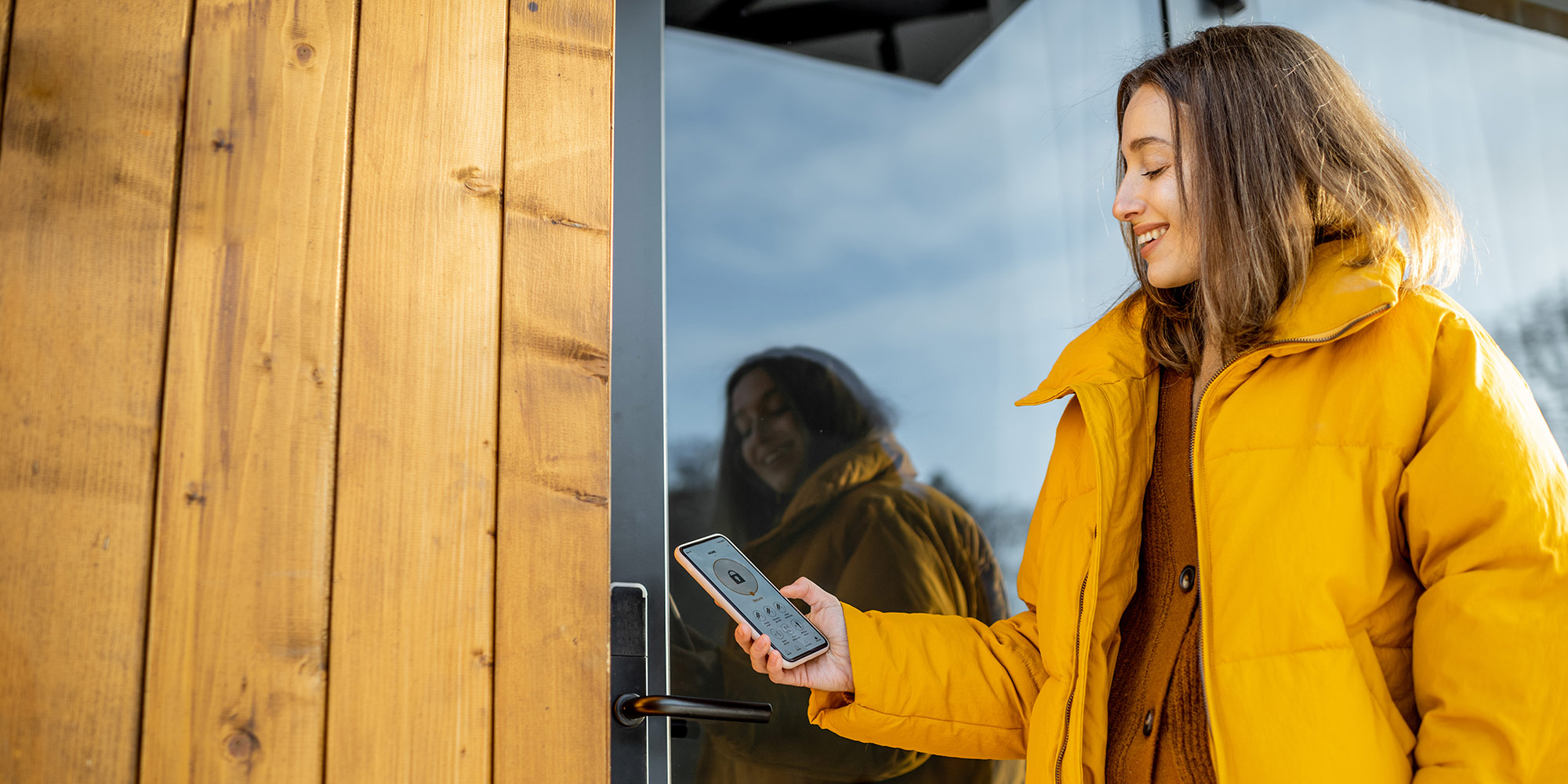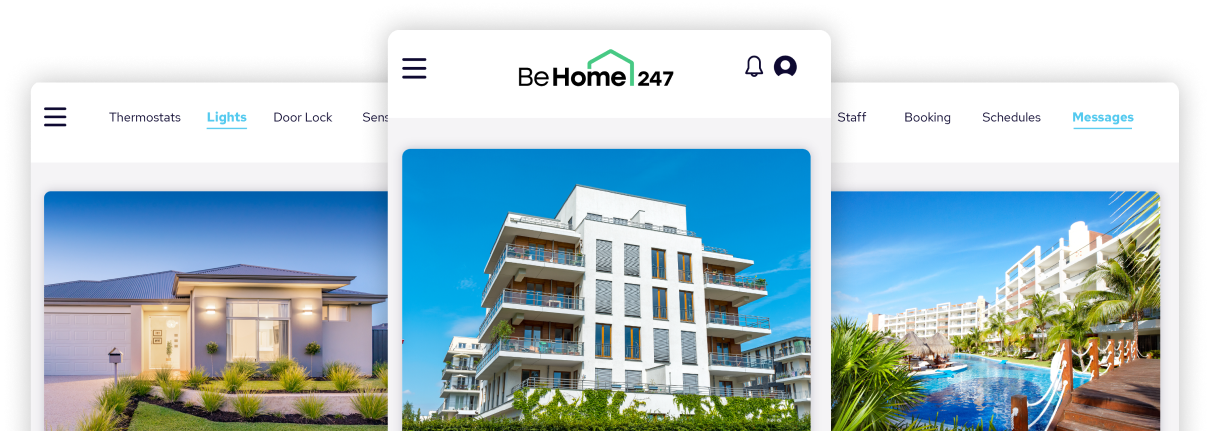
Are you considering an access control system or a smart lock for your rental property?
Both access control and smart locks can increase security, create a better tenant experience, improve efficiency, and more. However, an access control system is different from a smart lock. Depending on your needs, one solution may be better for your property.
If you’re wondering whether access control or smart locks are right for your property, you’re in the right place. In this post, we’ll discuss the differences between access control and smart locks – and how to choose the right one for you. To start, let’s take a look at smart locks.
What are smart locks?
Smart locks are a smart home device that can connect to your phone, computer, or other devices (Amazon Alexa, Google Assistant, or Apple devices). These electronic locks don’t use traditional keys for unlocking. Instead, you can open smart lock deadbolts with a code, keycard, key fob, smartphone app, and more.
You have a lot of options for smart door locks. Depending on your needs, you can choose smart locks with different connectivity (like Bluetooth or WiFi), opening mechanism (such as a touchscreen or access code), installation process, security (like biometric or auto-lock options), and more. Some of the best smart lock brands include Yale, Schlage, Kwikset, and August smart locks.
While smart locks can connect to your phone or computer, they generally can’t connect to other software you use (like property management software) without an access control system.
What is access control?
Access control is a software solution that controls entry and exit from your property. This software allows you or your team to monitor who is coming and going from your property. Most access control solutions keep a log of entries and exits, in case you need it later. With access control, you can also grant remote access to residents, guests, vendors, or delivery people.
Many access control systems use smart locks to control access to your property. So, you no longer have to rely on traditional locks and physical keys. Instead, you, your team, and tenants can unlock your property with a keypad, keycard, smartphone app, and more.
The right access control system can also integrate with other software you use – like property management software.
While there are standalone access control systems, they provide limited benefits. A better option is a complete property and device management system. That way, you can manage your property, access, devices, and more all on the same platform.
What are the differences between access control and smart locks?
At first glance, smart locks and access control seem very similar. They both allow you, your team, and tenants keyless access to your property. While they both have similar functions, there are important differences:
Comprehensive
One key difference between access control and smart locks is that access control is comprehensive. Smart locks only grant access to your property, individual units, or amenities.
In contrast, access control not only grants access but also monitors entry/exit activity, provides logs of this activity, enables remote access for non-residents, and allows you visibility into activity on your property. With access control, you can see the bigger picture of property access and find ways to optimize entries/exits, workflows, and property operations – all of which can save time, cut costs, and create a better tenant experience.
Integration
Another difference between access control and smart locks is integration. Smart locks can connect to your phone, tablet, or computer. However, they can’t connect to other property systems.
The right access control system can integrate with other tech you use (like property management software). This integration makes it easy for systems to share data and work together. Working together is important because access is only one part of your workflow and the tenant experience. For a seamless experience, you need your systems to communicate with each other – which smart locks on their own can’t do.
Flexibility
Along with comprehensiveness and integration, flexibility is another difference between access control and smart locks. If you don’t like a smart lock, you can switch it out. However, you have to change your entire access experience to make this swap.
Access control, on the other hand, allows you to change locks without changing the access experience. As long as you choose a lock that works with your access control system, your tenants will still have the same access experience (like using the same app to unlock doors). So, you have more flexibility to change parts of an access control system than a single smart lock.
Is access control or a smart lock better for your property?
Now that you know the differences, you might be wondering which one is best for your property. Here are the pros and cons of both smart locks and access control to help you decide:
Smart lock Pros:
- Less expensive: Smart locks can be less expensive than an access control system initially. However, smart locks don’t always have a good ROI
- Easy to install: Depending on the smart lock, you can install the lock with just a screwdriver over your existing deadbolt.
Smart lock cons:
- Less secure: Smart locks can be easier to bypass than access control systems. Plus, smart locks generally don’t let you monitor who is entering and exiting your building. This makes it harder to stop unauthorized personnel from accessing your building.
- Few management features: Most smart locks also don’t offer management capabilities. Tenants can unlock doors from their phones. However, you can’t monitor property-wide access from your phone or computer with smart locks. It’s also more difficult to grant remote entry with smart locks than access control.
- Lower visibility: Smart locks also provide little visibility into the workings of your property. Because smart locks simply grant access, they don’t provide you with access information, usage data, entry/exit logs, and other visibility features.
Access control pros:
- Comprehensive: Access control systems are a comprehensive solution that helps you manage access and permissions. Plus, access control systems help you keep an eye on property activity, log entries and exits for your records, and provide meaningful insights to improve your property.
- Flexible: The right access control system is also more flexible. So, you can use smart locks with a variety of connectivity/protocol options (like WiFi, Bluetooth, Z-Wave, and Zigbee). It’s also easy to change devices with an access control system without interrupting the tenant experience, as long as they have compatibility.
- Integration: Access control systems can integrate with other tech you use on your property. This system can transfer data between other systems seamlessly – reducing work for your team and increasing property-wide visibility.
- Scalability: An access control system can also grow with your property. With a modular access control system, you can use only the modules you need. This saves you money and provides the option to expand later. So, as your property grows, you can continue using the same access control system, instead of having to replace it – reducing costs.
Access control cons:
- Upfront investment: An access control system can be a larger upfront investment than smart locks. However, access control systems greatly improve the utility of your smart locks and generate a larger ROI.
- Larger tech stack: Adding an access control point solution can increase the size of your tech stack, making it harder to use. However, a complete property and device management system with access control can consolidate your tech stack, which saves money and makes your tech easier to use.
BeHome247 Access Control
For most properties, access control is the way to go. It provides more functionality, increases visibility, and can help you cut costs. However, the variety of access control choices can make it hard to choose the right one.
If you’re looking for best-in-class access control, BeHome247 is the smart choice. BeHome247 is a complete property and device management platform for multifamily, single family, vacation rental, and hospitality properties. With BeHome247, you only need one platform for access control, property management, and smart home automation.
BeHome247’s platform is also device agnostic. As such, you can use most devices with BeHome247’s access control system – including Z-Wave, Zigbee, WiFi, and Bluetooth devices. Unlike other access control systems, you aren’t limited to a few devices that work with the software. Instead, you have the freedom to choose the right device for your property.
Along with end-to-end capabilities, BeHome247 also has middleware capabilities. This means that BeHome247 can work with legacy tech and add new features. So, you can continue using tech that works for you, while adding best-in-class access control and property/device management.
Whether you’re looking for just an access control system or a complete property and device management platform, BeHome247 has what you need.
Book your BeHome247 demo today to boost your tenant experience, cut costs, and increase efficiency with access control.
